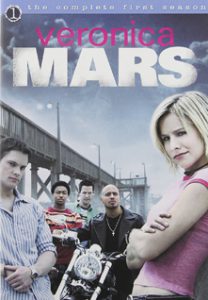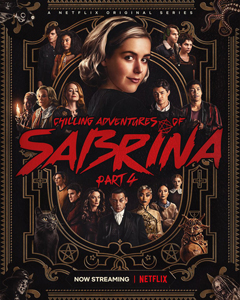I gave decent marks to the previous seasons (which this series calls “parts”) of “Chilling Adventures of Sabrina,” but in retrospect it was because I imagined its future upside. But now that the run is complete with the eight-episode Part 4 (December, Netflix), it’s clear that “Sabrina” doesn’t reach that upside.
It’s always visually impressive – a simple Google Image search demonstrates that this looks like a good show – and Kiernan Shipka nails the self-centered-yet-likable lead character, but the scripts are never on par.
Dueling Sabrinas
In the most creative episode of Part 4 – “The Endless” (7) – Sabrina Morningstar (one of two versions of Sabrina, as per Part 3’s split) travels to a dimension that pokes fun at the TV-making process in general and “Sabrina, The Teenage Witch” specifically. The Zelda and Hilda from that sitcom reprise their roles.
“Chilling Adventures of Sabrina” Part 4 (2020)
Netflix, 8 episodes
Showrunner: Roberto Aguirre-Sacasa
Stars: Kiernan Shipka, Ross Lynch, Lucy Davis, Chance Perdomo
Even though this is one of two episodes in this batch where my mind didn’t wander (the Lovecraftian episode three, “The Weird,” is the other), it demonstrates an unearned arrogance by the writing staff.
The alterna-Roz (Jaz Sinclair) notes that she has a condition that is making her go blind (as previously seen in the primary dimension) for the sake of having “an arc.” This line suggests that arcs are a silly, outdated TV construct. But since “Sabrina’s” supporting cast rarely has interesting arcs, and the writing staff doesn’t come up with a new convention in place of arcs, the line comes off as petulant.
Crossover falls flat
“Sabrina” has a weird trait of never sticking with me, despite having its share of big moments. Splitting Sabrina into Sabrina Spellman, teen witch, and Sabrina Morningstar, queen of Hell, at the end of Part 3 is cool. And they pay it off to some degree with technically well-crafted scenes featuring both Sabrinas (including a rare inspired moment where they bop to Billy Idol’s “Dancing with Myself”).
And Cousin Ambrose’s (Chance Perdomo) warning of dire consequences does come true, so Sabrina is forced to own up to her actions. (Whether she’ll ever learn has always been a tricky element of this show, because if she does learn, that arguably marks the destruction of her core trait.)
But a lot of big things fall flat. When Sabrina Morningstar encounters the “Teenage Witch” versions of Zelda (Beth Broderick) and Hilda (Caroline Rhea) in episode five, it’s a mundane moment rather than a “wow” moment.
Going further back, consider that Michelle Gomez plays both teacher Miss Wardwell and Hell servant Lilith. I have forgotten the connection between these two characters. “Sabrina’s” happenings are forgettable – partly because things are presented flatly and partly because the show doesn’t regularly build on important happenings.

Theo theories
I’m not sure if this next item is a problem or not, but I’ll throw it out there. Theo (Lachlan Watson) is a transgender male, as revealed previously, but Part 4 does nothing to dig into what that is like for him. He has a boyfriend, the Hobgoblin Robin (Jonathan Whitesell), and they are happy – except very briefly they aren’t, but then they are again.
I admit it’s possible that by not making a big deal of Theo’s minority status, “Sabrina” is actually being progressive. It’s saying “Theo is a person like anyone else, and doesn’t require Very Special Episodes.”
Looking back at Willow’s coming-out as gay in Season 4 of “Buffy,” it’s interesting to note that those writers likewise don’t place a flashing light above Willow’s sexual orientation. However, “Buffy” is driven by metaphors, so Willow’s magic abilities could be mined for insight into outsider status if one desired.
Unless I’m whiffing on something, “Sabrina’s” writers don’t say anything about Theo or any other of Sabrina’s friends in Part 4. They are just there. And not even to serve a plot, really. They are around because, well, it would be weird to have Sabrina be the only character.
Resolution, but no resonance
I suppose they serve as potential victims (potential consequences for Sabrina as she chooses her actions), but that brings us back to the problem that nothing resonates on “Sabrina.”
A side character named Dorian Gray (Jedidiah Goodacre) is killed off in such a throwaway moment that you could blink and miss it. Then someone mentions he’s immortal. So is he dead, or not? The writers don’t make that clear, but what is clear is that they don’t care (and neither do Dorian’s supposed friends).
I can’t help but think “Sabrina” could’ve excelled at 44-minute episodes about specific high school issues, like “Buffy” Season 1. Instead, it favors hourlong episodes that rarely coalesce around a reason for being. Yet they don’t create soap-opera momentum, either.
“Chilling Adventures of Sabrina” has this air of thinking it’s so cool because (like its lead character) it’s above it all, an awesome-looking trifle that’s too clever for things like character arcs or thematic meaning.
The writers are so focused on “Sabrina” – and Sabrina – being its own thing that they end up with a show that’s not about anything.

